LPN Job Description
Upon learning how to become an LPN, make sure you know what a typical day would be like for you.
This includes knowing what types of responsibilities you have and what patient services you would provide.
Your role as an LPN may cross over into some of the same responsibilities as a certified nursing assistant (CNA).
In both cases, you will usually work directly with patients performing a variety of duties working with other LPNS under the supervision of at least one registered nurse (RN).
The medical center where you work might also have at least one phlebotomist (someone who retrieves blood and prepares samples for testing) and an EKG Technician (heart monitoring specialist) on duty.
Duties
- Provide direct nursing care to patients as directed by an RN
- Initiate and maintain intravenous (IV) treatments
- Administering medications as prescribed by a physician
- Assess the person’s health condition and identify any physical or mental needs
- Work with doctors and nurses to encourage patients to a long-term care plan
- Assist patients with their daily living activities such as bathing, dressing, and grooming (if no CNA is present)
- Change bedpans and catheters or replace bandages
- Provide therapeutic treatments to reduce pain, treat wounds, or improve function
- Monitor patient’s condition and progress
Salary
The highest percentage (50%) of entry-level LPS earn the median salary of $48,070, which is determined to be the average for the U.S.
Most people starting out earn between $37,150-$63,790.
However, some people might earn as low as approximately $35,124 or up to $51,748.
You will notice a difference in earnings based on geographical location, which often is determined by the cost of living.
After receiving a certification, your salary may rise to at least an average of $63,790.
The highest you might earn totals at least $55,969-$63,790 after at least two or more years of experience.
Top-paying salaries reach up to about $75,950 in northeastern coastal states, western coastal states from north to south, and Alaska.
Annually National Average Salary: $64,150
Average Annual Salary by State
| State | Avg. Annual Salary |
|---|---|
| Alabama | $50,760 |
| Alaska | $77,850 |
| Arizona | $72,840 |
| Arkansas | $52,540 |
| California | $79,090 |
| Connecticut | $70,240 |
| Delaware | $66,510 |
| District of Columbia | $70,530 |
| Florida | $60,320 |
| Georgia | $58,090 |
| Hawaii | $67,540 |
| Idaho | $59,340 |
| Illinois | $68,450 |
| Indiana | $62,990 |
| Iowa | $59,640 |
| Kansas | $59,930 |
| Kentucky | $57,410 |
| Louisiana | $54,610 |
| Maine | $72,600 |
| Maryland | $70,700 |
| Massachusetts | $76,400 |
| Michigan | $65,430 |
| Minnesota | $61,270 |
| Mississippi | $49,960 |
| Missouri | $58,900 |
| Montana | $58,710 |
| Nebraska | $60,240 |
| Nevada | $71,460 |
| New Hampshire | $73,850 |
| New Jersey | $71,300 |
| New Mexico | $56,690 |
| New York | $66,380 |
| North Carolina | $62,040 |
| North Dakota | $60,110 |
| Ohio | $60,600 |
| Oklahoma | $55,270 |
| Oregon | $78,160 |
| Pennsylvania | $62,550 |
| Rhode Island | $77,240 |
| South Carolina | $58,430 |
| South Dakota | $51,230 |
| Tennessee | $53,490 |
| Texas | $60,020 |
| Utah | $61,390 |
| Vermont | $68,580 |
| Virginia | $63,380 |
| Washington | $79,970 |
| West Virginia | $52,540 |
| Wisconsin | $61,680 |
| Wyoming | $61,080 |
| Guam | $37,360 |
| Puerto Rico | $28,840 |
| Virgin Islands | $57,320 |
Annual Average Salary: Top 5 States
The top earning state in the field is Washington, where the average salary is $79,970.
These are the top 5 earning states in the field:
* Employment conditions in your area may vary.
How to Become: Step-by-Step
Step 1 Read about LPN programs and related careers (ex: RN or Medical Assistant occupations).
Do this, so you will know what you to expect if working as an LPN.
For instance, some LPNs may have to use needles on patients.
Can you handle that?
What’s more, make sure the class times and clinical training portions fit into your schedule, which won’t be hard.
After all, you have the chance to pursue online training for at least a portion of your LPN coursework.
Your time researching the pros and cons of becoming an LPN will help you decide if you should pursue this line of work or, for example, stay a CNA, Medical Assistant, or Phlebotomist.
It also could make you decide not to pursue a health career at all, or you could train for an office position, such as one in billing and coding, that doesn’t require much patient contact except financial and insurance questions.
Step 2 Choose an association-approved LPN learning program.
The National Council of State Boards of Nursing, Inc. (NCSBN) provides one of the most important guides for becoming a credible LPN.
Make sure your classroom and clinical curriculum prepares you for your National Council Licensure Examination (NCLEX-PN) test.
Read through your potential school’s academic catalog to make sure and see if they provide a virtual or in-person tour.
Step 3 Sign up for classes.
This may require proof that you have a high school diploma.
Makes sure you also have your picture identification and other important information handy, especially if you’re trying to acquire financial assistance for your coursework.
Keep in mind your college may require that you’re at least 18 years old unless you perhaps have your parents’ consent to start early.
Step 4 Prepare to take the NCLEX.
When you’re ready, schedule time to take the NCLEX-PN exam, which will provide you with the LPN credential.
This test will have about 75-265 questions, and each question may become harder and harder as you work your way through it.
Make sure you prepare beforehand, however.
The NCSBN provides you with a practice exam that will help you prepare for the “real” test day.
Step 5 Take the exam.
You have six hours to complete the NCLEX exam for LPNs.
The scoring is either “pass” or “fail,” and you will receive a reading of what areas you excelled in and other categories in which you might need more practice.
If you don’t pass, you can try again after studying, and perhaps ask health professionals questions about topics that confuse you.
Step 6 Seek employment opportunities.
Ideally, you should already work in a health care environment, such as fulfilling CNA or home health care duties.
Otherwise, you could perhaps start out in an unpaid internship or find employment as a medical assistant – any experience in a hospital or other medical care setting will help.
Then, by the time you achieve your first LPN certificate, you will become equipped to work full time and carry out all your duties.
Popular Programs
Education Required
It usually only takes a year or two to become an LPN, unlike RN coursework, which typically requires enrollment in a four-year degree program.
Whether you decide to stay an LPN or move on to become an RN, expect to also take continuing education classes throughout your career to maintain your licensure and update your proficiency in current medical technology.
LPN Courses To Take
Classes you might take during your first two years of training include foundational instruction in Anatomy, Microbiology, Pathology, and Physiology.
Even if you don’t use all these general courses, they prepare you for whatever your next step in your nursing career is.
You also will probably need some basic pharmacology courses and will learn about patient privacy laws and medical practice legal issues.
In addition, you’ll need to take classes that teach you how to use the various testing and treatment machines you’d be using.
For instance, you’ll need to know how to use a blood pressure or heart rate monitor or an EKG machine and thermometers.
Video About The Career
Licensing & Certification
Licensing requirements for careers as Licensed Practical Nurses (LPNs) vary by state, but you should concern yourself more with what the health care facilities are looking for.
Most of them prefer that you become certified and licensed by a nationally recognized association.
To begin with, make sure you receive your LPN training from an approved nursing school and pass the National Council Licensure Examination (NCLEX-PN).
After that, you could acquire additional certificates, such as patient counseling, advanced life support, IV administration, and hospice care or phlebotomy and EKG reading ones.
Licensing Exam Eligibility Requirements
You will have to complete a series of steps, such as a minimum amount of coursework, and gain some clinical experience.
Then, you can study and practice for the exams you want to take.
Before you take the NCLEX-PN exam, check with your nursing regulatory body (NRB) to find out how much time you need to put into coursework and in-person training before registering for certification testing.
Average Training Program Duration: 1-2 Years
Job Outlook
The 9% job outlook predicted may not seem much.
In fact, it’s only about as fast as it normally would occur for this field or similar occupations.
However, the job growth outlook for LPNS could increase to 24% according to a recent study.
If you have a love for the senior population, for instance, you maybe wouldn’t mind working in a nursing home, assisted living center, or in home health care.
You could even become a live-in nurse or take a position where you would stay on-site for 24 hours.
Otherwise, you could increase your chance of finding a position if you try universities or high schools or might consider becoming a pediatric LPN or working in a family clinic.
Whatever you decide, your determination will get you far in the nursing field. By the way, some LPNs also find chances to start out in at-risk neighborhoods where the medical centers might be short-handed.
Employment Growth Projection: 3%
2023
2033
That's a higher than average projected growth of 16,900
Should You Become an LPN?
Overall Satisfaction: High

According to the Advisory Board, 95% of 2,002 LPNs surveyed in 2018 said they are “glad they became a nurse.” 80% of these nurses interviewed said if they had to do it all over again, they would.
A similar percentage of RNs said this too upon filling out the same questionnaire.
Making a difference in people’s lives and helping people seems to remain the priority for people in this job role.
Satisfaction for the ones working in this occupation also found it rewarding to use the education, license, and certificates they earned.
This doesn’t happen for everyone, as some people in nonmedical jobs often have a harder time finding work after graduation.
Most LPNs and RNs also said they like their jobs, and that’s what fulfills them.
Moreover, many of them said they like being in a job they are good at and can be proud of.
They also do enjoy the relationships they build with patients, except probably when they lose one when they pass away.
Average Salary: Medium

The average U.S. salary usually totals about $48,070 in 2022, but statewide averages vary.
For instance, you might make an average of $60,531 per year in New York but about $49,562 in Wisconsin.
Keep in mind, however, that the cost of living does fluctuate across the nation, so the percentage of your money allocated to essential living expenses and housing matters more than how much you earn per year.
Job Growth Outlook: Medium

The Bureau of Labor Statistics predicts a 9% job growth outlook for LPNs in the U.S. until 2030.
The total number of new jobs may reach about 60,700 over a 10-year period starting from 2020.
Education Duration: 1-2 Years

You need a minimum of 12-18 months of training.
You can also acquire an associate degree, which takes two years.
If preparing to become a registered nurse, it might take you four years or longer.
It’s possible to work as an LPN while studying to become an RN.
You also need clinical experience to prepare you for your exam.
Personal Skills Needed

- Work well under pressure
- Able to serve several patients at once
- Show compassion when addressing patient needs
- Ability to stay calm – not lose your temper
- Can lift and guide people to tub, toilet, sink, etc.
- No fear of needles or bodily fluids
- Able to cooperate with the rest of the staff
- Ability to solve problems and work out conflicts
Frequently Asked Questions
How long do you have to go to school to become an LPN?
Some night coursework might take you about 18 months if you’re working full time.
If you enroll in a day program, it might only take you about a year to complete.
However, you must dedicate some of your training time to clinical practice, which may include working as a CNA or medical assisting position for less of a pay rate than if you were to become an LPN.
How much money does an LPN make a year?
An LPN makes an average of $48,070 per year in the U.S., with salaries ranging from approximately $37,150-$63,790.
Whether you have achieved your first required certification to become an LPN and how many training hours you have completed may affect how much you earn.
Cities you can look for LPN positions across the nation besides the major metropolitan areas (New York, Dallas, or San Francisco, for instance) include these locations: Ocean Springs, MS or Chelmsford, MA, or just about Andalusia, AL, any place
What kind of education do you need to be an LPN?
The requirements for becoming a licensed practical nurse, or LPN, vary from state to state.
However, it usually lasts about a year, and you need to enroll in a state-approved training program.
Are LPNs in high demand?
You can expect the demand to continue to grow as fast as average (9%) between 2020-2030.
Opportunities may come to you easier if you apply to positions in hospitals and nursing homes or home health, hospice, or clinical settings.
It’s also possible to find an LPN position at a doctor’s office that has a patient base too much to handle just for a doctor and nurse.
What skills do you need to have to be an LPN?
Personal qualities required to become an LPN include the ability to show compassion to patients requiring care and excellent communication skills.
You also must show that you have the confidence to administer heart rhythm tests, check vital signs, draw blood, and interpret test results.
Leadership skills also are necessary if you become a head practical nurse, and this may include the ability to coordinate responsibilities amongst nursing assistants.
If you’re a person who likes to be in charge, become ready to become a leader now if you ever decide to move up from being an LPN to an RN.
 Licensed Practical Nurse (LPN) Info by State
Licensed Practical Nurse (LPN) Info by State

- Alabama
- Alaska
- Arizona
- Arkansas
- California
- Colorado
- Connecticut
- Delaware
- Florida
- Georgia
- Hawaii
- Idaho
- Illinois
- Indiana
- Iowa
- Kansas
- Kentucky
- Louisiana
- Maine
- Maryland
- Massachusetts
- Michigan
- Minnesota
- Mississippi
- Missouri
- Montana
- Nebraska
- Nevada
- New Hampshire
- New Jersey
- New Mexico
- New York
- North Carolina
- North Dakota
- Ohio
- Oklahoma
- Oregon
- Pennsylvania
- Rhode Island
- South Carolina
- South Dakota
- Tennessee
- Texas
- Utah
- Vermont
- Virginia
- Washington
- West Virginia
- Wisconsin
- Wyoming
Licensed Practical Nurse (LPN) Resources
- 16 Pros And Cons Of Being A Licensed Practical Nurse (LPN)
- How Much Does It Cost to Become a Licensed Practical Nurse (LPN)?
- Online Licensed Practical Nurse Training Programs
More Medical Careers
| Career | |
|---|---|
 | Certified Nursing Assistant Working as a Certified Nursing Assistant is an entry-level role that will give you hands-on experience when you are ready to take the next step in your medical career. |
 | Dental Assistant Dental assistants help dentists to provide patient care, keep records, and care for the dental equipment. |
 | Dental Hygienist Dental hygienists take care of cleaning teeth to promote hygiene and help avoid cavities and gum problems. |
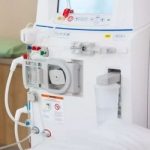 | Dialysis Technician Dialysis technicians maintain and monitor dialysis equipment, and also act as primary caregivers for patients undergoing dialysis treatment. |
 | Dog Groomer Dog groomers attend to grooming dogs, usually at dog salons or big pet-related chain stores. |
 | Healthcare Administrator Healthcare administrators – also known as healthcare executives or health services managers – are responsible for the planning, direction, and coordination of medical and health services. |
 | Home Health Aide Home health aides provide home care to individuals who require assistance in their day-to-day living. |
 | Medical Assistant Medical assistants support the work of physicians, nurses, and other health professionals. |
 | Medical Biller and Coder Medical billers and coders manage, organize, and code various health information data. |
 | Medical Technologist Medical laboratory technologists collect bodily samples and conduct tests to analyze those samples. |
 | Medical Transcriptionist Medical transcriptionists go over voice recordings to convert them into written texts. |
 | Nutritionist As a Nutritionist, you’ll be tasked with creating meal plans, counseling, and understanding dietary restrictions for all types of clients. |
 | Patient Access Representative The work involves helping people to orient themselves to the space and everything that is going on. |
 | Patient Care Technician Patient care techs work directly with patients helping them with daily activities and assist the medical staff by measuring and monitoring the patients' vital signs among other tasks. |
 | Pharmacy Technician Pharmacy technicians provide patients with medications through prescription or over the counter. |
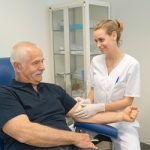 | Phlebotomist As a Phlebotomist, it will be your responsibility to take blood samples from patients and send them to the lab for further testing. |
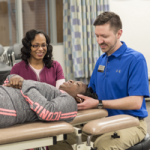 | Physical Therapist Assistant Physical therapist assistants provide physical therapy services to patients and aide to physical therapists. |
 | Professional Recovery Coach A professional recovery coach is a life coach who works with someone during their addiction recovery process. |
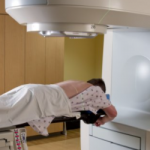 | Radiation Therapist Allied health provisional who specializes in radiation oncology treatments. |
 | Registered Health Information Technician Registered Health Information Technician (RHIT) help store and verify accuracy of health records as well as analyze patient data. |
 | Registered Nurse (RN) Registered Nurses provide hands-on patient care in various settings, mainly hospitals, and clinics. |
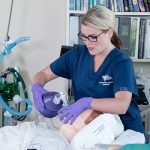 | Respiratory Therapist Respiratory therapists treat and care for patients who experience breathing difficulties. |
 | Sterile Processing Technician A sterile processing technician is a healthcare professional who is responsible for preparing, sterilizing, maintaining, packaging, and storing medical tools and equipment used in surgical and other medical procedures. |
 | Surgical Technologist Surgical technologists – also known as operating room techs – prepare operating rooms and assist doctors and nurses during surgical procedures. |
 | Vet Office Manager Veterinary office managers work to make sure that the daily operations run smoothly and efficiently at veterinary hospitals or veterinary clinics. |
 | Veterinary Assistant Veterinary Assistants work closely with Veterinarians to handle routine animal care. |
 | Veterinary Technician Veterinary Technicians assist veterinarians as well as diagnosing and treating animals, mostly in private clinics. |
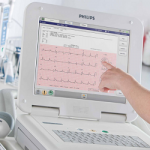 | EKG Technician EKG technicians test and monitor the cardiovascular system. |
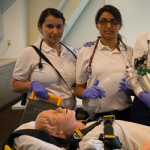 | EMT Trained emergency medical technician that arrives at the scene to provide medical services such as resuscitation. |
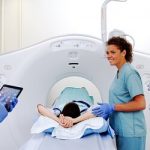 | MRI Technologist MRI Technologists use a machine to scan the body and create a detailed image of the inside for doctors to analyze. |
 | Optician Opticians are technicians and salespersons at the same time who spends most of their day talking to customers, reading prescriptions written by doctors, and dispensing glasses and lenses. |
 | Ultrasound Technician Ultrasound technicians aid physicians in monitoring and diagnosing patients through the use of ultrasonic imaging technology. |
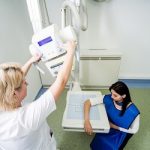 | X-Ray Technician X-Ray Technicians are medical imaging professionals who use technology to visualize the inside of our bodies. |














